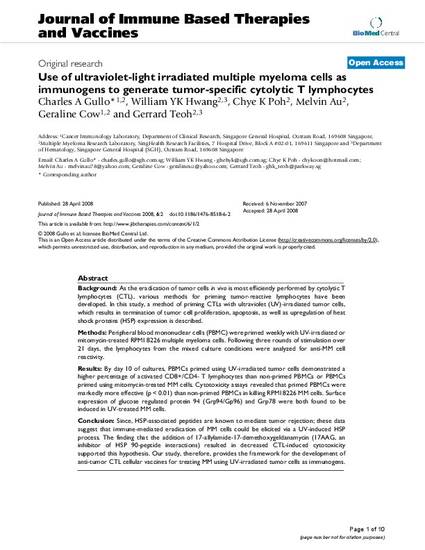
Background:
As the eradication of tumor cells in vivo is most efficiently performed by cytolytic Tlymphocytes (CTL), various methods for priming tumor-reactive lymphocytes have been developed. In this study, a method of priming CTLs with ultraviolet (UV)-irradiated tumor cells, which results in termination of tumor cell proliferation, apoptosis, as well as upregulation of heat shock proteins (HSP) expression is described.
Methods:
Peripheral blood mononuclear cells (PBMC) were primed weekly with UV-irradiated or mitomycin-treated RPMI 8226 multiple myeloma cells. Following three rounds of stimulation over 21 days, the lymphocytes from the mixed culture conditions were analyzed for anti-MM cell reactivity.
Results:
By day 10 of cultures, PBMCs primed using UV-irradiated tumor cells demonstrated a higher percentage of activated CD8+/CD4- T lymphocytes than non-primed PBMCs or PBMCs primed using mitomycin-treated MM cells. Cytotoxicity assays revealed that primed PBMCs were markedly more effective (p < 0.01) than non-primed PBMCs in killing RPMI 8226 MM cells. Surface expression of glucose regulated protein 94 (Grp94/Gp96) and Grp78 were both found to be induced in UV-treated MM cells.
Conclusion:
Since, HSP-associated peptides are known to mediate tumor rejection; these data suggest that immune-mediated eradication of MM cells could be elicited via a UV-induced HSP process. The finding that the addition of 17-allylamide-17-demethoxygeldanamycin (17AAG, an inhibitor of HSP 90-peptide interactions) resulted in decreased CTL-induced cytotoxicity supported this hypothesis. Our study, therefore, provides the framework for the development of anti-tumor CTL cellular vaccines for treating MM using UV-irradiated tumor cells as immunogens.

The copy of record is available from the Journal of Immune Based Therapies and Vaccines at http://www.jibtherapies.com/content/6/1/2. Copyright © 2008 Gullo et al; licensee BioMed Central Ltd. This is an Open Access article distributed under the terms of the Creative Commons Attribution License (http://creativecommons.org/licenses/by/2.0), which permits unrestricted use, distribution, and reproduction in any medium, provided the original work is properly cited.
doi:10.1186/1476-8518-6-2